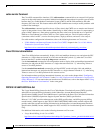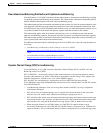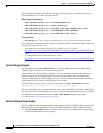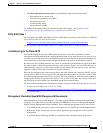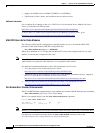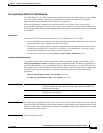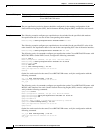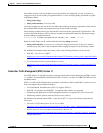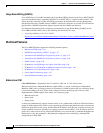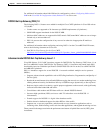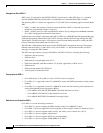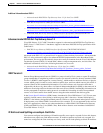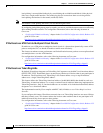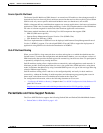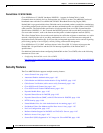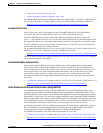
1-96
Cisco uBR7200 Series Universal Broadband Router Software Configuration Guide
OL-2239-05
Chapter1 Overview of Cisco uBR7200 Series Software
cops tcp window-size
Usage Based Billing (SAMIS)
Cisco IOS Release 12.3(9a)BC introduces the Usage-Based Billing feature on the Cisco uBR7246VXR
universal broadband router, supporting DOCSIS 1.0- and DOCSIS 1.1-compliant cable modems. This
feature provides subscriber account and billing information in the Subscriber Account Management
Interface Specification (SAMIS) format. SAMIS is specified by the Data-over-Cable Service Interface
Specifications (DOCSIS) Operations Support System Interface (OSSI) specification.
For additional information about configuring and monitoring Usage-Based Billing (SAMIS) on the
Cisco uBR7246VXR CMTS, refer to the following document on Cisco.com:
• Usage Based Billing for the Cisco CMTS
http://www.cisco.com/en/US/products/hw/cable/ps2217/products_feature_guide09186a00801ef1d7.html
Multicast Features
The Cisco uBR7200 Series supports the following multicast options:
• Bidirectional PIM, page 1-96
• DOCSIS Set-top Gateway (DSG) 1.0, page 1-97
• Advanced-mode DOCSIS Set-Top Gateway Issue 1.1, page 1-97
• Advanced-mode DOCSIS Set-Top Gateway Issue 1.2, page 1-99
• IGMP Version 3, page 1-99
• IP Multicast Load Splitting across Equal-Cost Paths, page 1-99
• IP Multicast over ATM Point-to-Multipoint Virtual Circuits, page 1-100
• IP Multicast over Token Ring LANs, page 1-100
• Source Specific Multicast, page 1-101
• Stub IP Multicast Routing, page 1-101
Bidirectional PIM
Cisco IOS Releases—Supported in the Cisco IOS 12.2 BC and 12.1 EC release trains.
Bidirectional Protocol Independent Multicast (bidir-PIM) is a variant of the Protocol Independent
Multicast (PIM) suite of routing protocols for IP multicast. In PIM, packet traffic for a multicast group
is routed according to the rules of the mode configured for that multicast group. The Cisco IOS
implementation of PIM supports three modes for a multicast group:
• Bidirectional mode
• Dense mode
• Sparse mode
A router can simultaneously support all three modes or any combination of them for different multicast
groups. In bidirectional mode, traffic is only routed along a bidirectional shared tree that is rooted at the
rendezvous point (RP) for the group. In bidir-PIM, the IP address of the RP acts as the key to having all
routers establish a loop-free spanning tree topology rooted in that IP address. This IP address does not
need to be a router, but can be any unassigned IP address on a network that is reachable throughout the
PIM domain. Using this technique is the preferred configuration for establishing a redundant RP
configuration for bidir-PIM.



